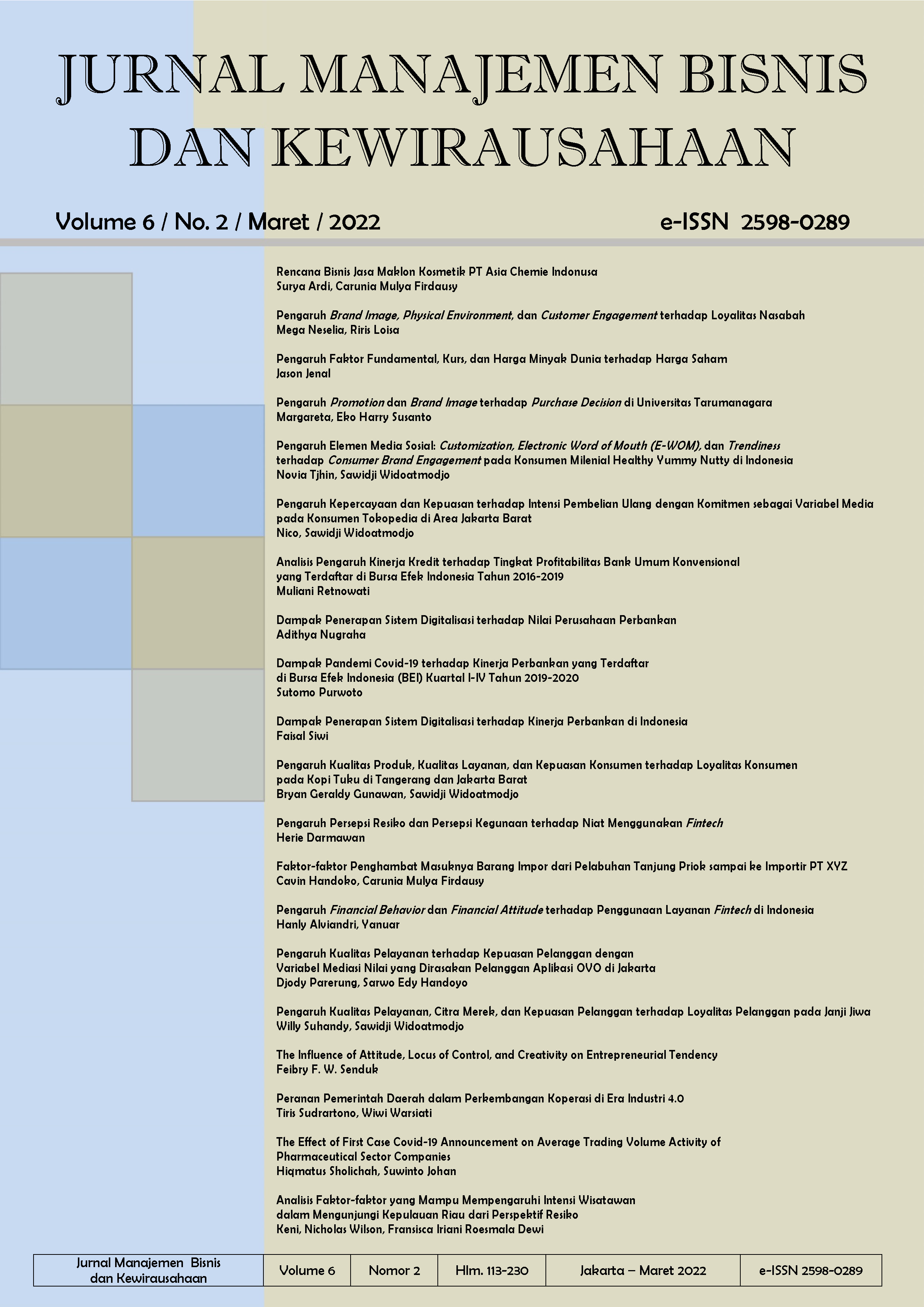Pengaruh Elemen Media Sosial: Customization, Electronic Word of Mouth (E-WOM), dan Trendiness terhadap Consumer Brand Engagement pada Konsumen Milenial Healthy Yummy Nutty di Indonesia
Main Article Content
Abstract
This research aims to analyze the relation between Customization, Electronic Word of Mouth (E-WOM), and Trendiness with millennial's consumer brand engagement of Healthy Yummy Nutty in Jakarta. The data were collected from Healthy Yummy Nutty consumers in Jakarta from 16 years old until 38 years old. The research is conducted on 200 Healthy Yummy Nutty consumers in Jakarta. The result is an analysis using SPSS Software and using the multiple regression method. Based on the results of existing research, it is concluded that the involvement of consumers in the brand is very necessary because it can make the company image last in the long term and the presence of consumers is also a very important factor for the success of a company.
Penelitian ini bertujuan untuk menganalisis hubungan customization, electronic word of mouth (E-WOM), dan trendiness dengan consumer brand engagement kaum milenial Healthy Yummy Nutty di Jakarta. Data dikumpulkan dari konsumen milenial Healthy Yummy Nutty di Jakarta dari usia 16 tahun sampai dengan usia 38 tahun. Penelitian ini dilakukan terhadap 200 konsumen Healthy Yummy Nutty di Jakarta. Hasilnya dianalisis menggunakan perangkat lunak SPSS dan menggunakan metode regresi berganda. Berdasarkan hasil penelitian yang ada, disimpulkan bahwa keterlibatan konsumen terhadap merek sangat diperlukan karena dapat membuat citra perusahaan dapat bertahan dalam jangka panjang dan kehadiran konsumen juga merupakan faktor yang sangat penting atas keberhasilan suatu perusahaan.
Article Details
This work is licensed under a Jurnal Manajemen Bisnis dan Kewirausahaan Creative Commons Attribution-ShareAlike 4.0 International License.
References
Godey, B., Manthiou, A., Pederzoli, D., Rokka, J., Aiello, G., Donvito, R., & Singh, R. (2016). Social media marketing efforts of luxury brands: Influence on brand equity and consumer behavior. Journal of Business Research, 69(12), 5833–5841. https://doi.org/10.1016/j.jbusres.2016.04.181
Hollebeek, L. D. (2011). Demystifying customer brand engagement: Exploring the loyalty nexus. Journal of Marketing Management, 27(7–8), 785–807. https://doi.org/10.1080/0267257X.2010.500132
Litvin, S. W., Goldsmith, R. E., & Pan, B. (2008). Electronic word-of-mouth in hospitality and tourism management. Tourism Management, 29(3), 458–468. https://doi.org/10.1016/j.tourman.2007.05.011
Muntinga, D. G., Moorman, M., & Smit, E. G. (2011). Introducing COBRAs: Exploring motivations for Brand-Related social media use. International Journal of Advertising, 30(1), 13–46. https://doi.org/10.2501/IJA-30-1-013-046
Sano, K. (2014). Do social media marketing activities enhance customer satisfaction, promote positive WOM and affect behavior intention? An investigation into the effects of social media on the tourism industry. Doshisha Shogaku, 66(3–4), 491–515. https://doi.org/10.14988/pa.2017.0000013844
Seo, E. J., & Park, J. W. (2018). A study on the effects of social media marketing activities on brand equity and customer response in the airline industry. Journal of Air Transport Management, 66, 36–41. https://doi.org/10.1016/j.jairtraman.2017.09.014
Willett, W. C. (2019). Why is peanut butter “healthy” if it has saturated fat? Harvard Health. https://www.health.harvard.edu/nutrition/ask-the-doctor-why-is-peanut-butter-healthy-if-it-has-saturated-fat
Yang, F. X. (2017). Effects of restaurant satisfaction and knowledge sharing motivation on eWOM intentions: The moderating role of technology acceptance factors. Journal of Hospitality and Tourism Research, 41(1), 93–127. https://doi.org/10.1177/1096348013515918
Zhu, Y. Q., & Chen, H. G. (2015). Social media and human need satisfaction: Implications for social media marketing. Business Horizons, 58(3), 335–345. https://doi.org/10.1016/j.bushor.2015.01.006


